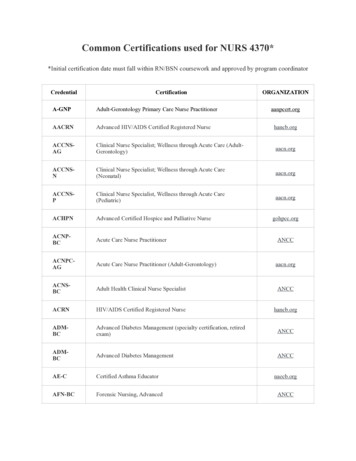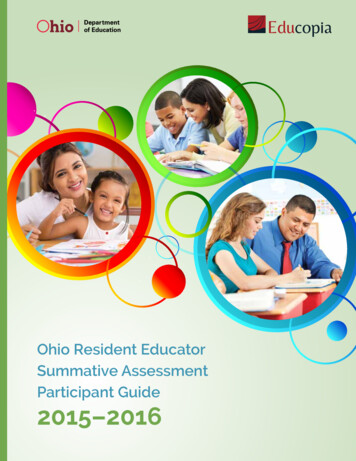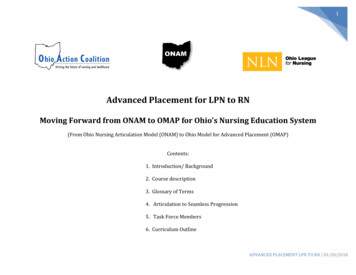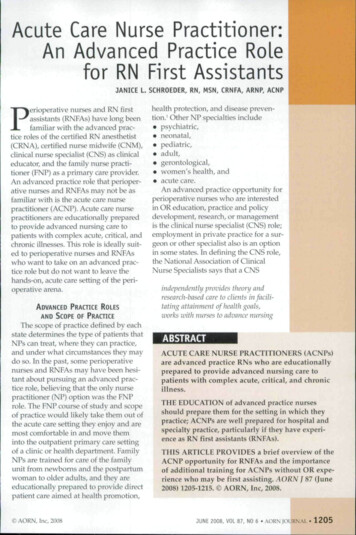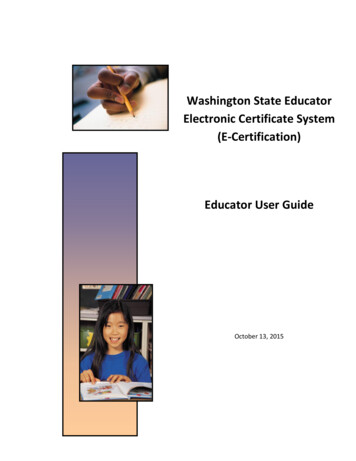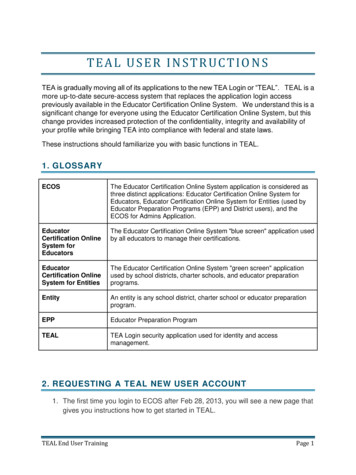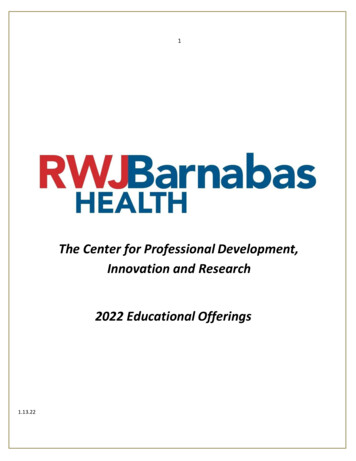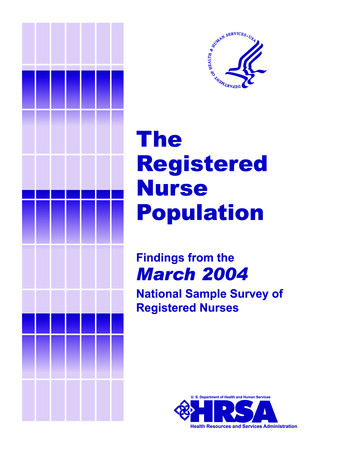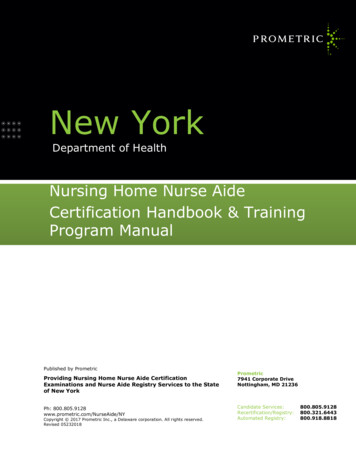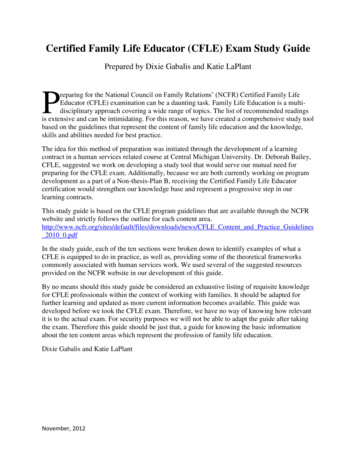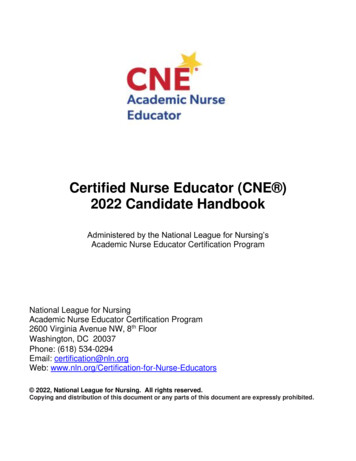
Transcription
Certified Nurse Educator (CNE )2022 Candidate HandbookAdministered by the National League for Nursing’sAcademic Nurse Educator Certification ProgramNational League for NursingAcademic Nurse Educator Certification Program2600 Virginia Avenue NW, 8th FloorWashington, DC 20037Phone: (618) 534-0294Email: certification@nln.orgWeb: www.nln.org/Certification-for-Nurse-Educators 2022, National League for Nursing. All rights reserved.Copying and distribution of this document or any parts of this document are expressly prohibited.
CNE 2022 Candidate HandbookPLEASE NOTE that the Candidate Handbooks are copyrighted material developed and owned by theNLN. The document is downloadable for individual use. Use of the handbooks for commercialpurposes is strictly prohibited.It is essential that candidates keep the handbook readily available for reference until they have completed theexamination. Candidates are responsible for knowing its contents.Copying and distribution of this document or any parts of this document are expressly prohibited.ContentsGeneral Information . 2 - 15Taking the Examination .20 - 21Identification . 20Security . 20Practice Examination . 20Timed Examination . 20Examination Restrictions . 21Copyrighted Examination Questions . 21Misconduct . 21Value of Certification.2Goals of CNE Certification .2Definition of Academic Nurse Educator Practice .2Eligibility Requirements .3Statement of Nondiscrimination . 4Certification .5Recertification/Renewal .5About the CNE Examination .5Test Format .6Examination Test Blueprint .6Test Blueprint .6Detailed Test Blueprint .7Preparing for the Examination . .11Helpful References .12Sample Questions .14Live On-Line Proctored Test Administration .22-26Following the Examination . 27 - 28Scoring . 27Score Report . 27Requests for Hand Scoring . 27Scores Cancelled by NLN or SCANTRON . 28Candidates Who Pass the Examination . 28Candidates Who Do Not Pass the Examination . 28Confidentiality. 28Applying for the Examination . 16 - 17Fees .16Verification .16Agreement of Authorization & Confidentiality .16Confirmation of Eligibility .17Examination Reapplication .17Special Arrangements for Candidates with Disabilities .17Policies .29 - 30Request for Appeal . 29Refund Policy . 29Extending Testing Eligibility . 29Ethics Case Procedures. 30Authorized use of CNE . 30Examination Administration . 18 - 19Scheduling an Examination .18Examination Times and Days .18Assessment Center Locations .18Examination Appointment Changes .19Missed Appointments and Cancellations .19Inclement Weather, Power Failure or Emergencies.19Special Forms. 31 - 33Request for Special Examination Accommodations . 31Documentation of Disability-Related Needs . 32Withdrawal of Examination Request . 33How to Contact the NLN:National League for NursingAcademic Nurse Educator Certification Program2600 Virginia Avenue NW, 8th FloorWashington, DC 20037Phone: (618) 534-0294Email: certification@nln.orgWebsite: www.nln.org/Certification-for-NurseEducatorsHow to Contact SCANTRON:P.O. Box 570Morrisville, NC 27560Phone: (919) 572-6880Email: candidatesupport@scantron.comWebsite: www.scantron.comSCANTRON is an independent testing agency thatprovides testing and measurement services to theANECP.1
CNE 2022 Candidate HandbookGENERAL INFORMATIONThe Value of CertificationMissionCertification in any field is a mark of professionalism.For academic nurse educators, it establishes nursingeducation as a specialty area of practice and createsa means for faculty to demonstrate their expertise inthis role. It communicates to students, peers and theacademic and health care communities that thehighest standards of excellence are being met. Bybecoming credentialed as a certified nurse educator,you serve as a leader and a role model. Certificationis the mark of distinction for nursing faculty.The mission of the Academic Nurse EducatorCertification Program is to promote excellence inthe advanced specialty role of the academic nurseeducator.Goals of CNE Certification The National League for Nursing endorses theconcept of voluntary, periodic certification for allacademic nurse educators meeting educational andpractice requirements. Distinguish academic nursing education as aspecialty area of practice and an advancedpractice role within professional nursing.Recognize the academic nurse educator’sspecialized knowledge, skills and abilitiesStrengthen the use of core competencies ofnurse educator practice.Contribute to nurse educators’ professionaldevelopment.Support the nurse educator in active pursuanceof continuance competency.Definition of Academic Nurse Educator PracticeThe Scope of Practice for Academic Nurse Educators, 2012 Revision* was developed by the National League forNursing’s Certification Governance Committee. The purpose of the document was to “describe academic nursingeducation as a specialty area and an advanced nursing practice role within professional nursing” (p. 4). Thedescription includes a definition, historical perspective, statements of values and beliefs, a theoretical framework,scope of practice, and competencies or standards of practice of academic nursing education. Statements relevant toa definition of academic nurse educator practice include the following (p. 5):Academic nursing education is the process of facilitating learning through curriculum design,teaching, evaluation, advisement, and other activities undertaken by faculty in schools of nursing.Academic nursing education is a specialty area and an advanced practice role within professionalnursing.Academic nurse educators engage in a number of roles and functions, each of which reflects thecore competencies of nursing faculty (see pp. 14-19). The extent to which a specific nurse educatorimplements these competencies varies according to many factors, including the mission of thenurse educator’s institution, the nurse educator’s rank, the nurse educator’s academic preparation,and the type of program in which the nurse educator teaches.Nursing education takes place in diverse settings that include, but are not limited to, technicalschools, hospitals, two-year colleges, four-year colleges, and universities. The implementation ofthe academic faculty role may occur in traditional classroom-based environments as well as in nontraditional environments.*National League for Nursing. (2012). The scope of practice for academic nurse educators, 2012Revision. New York, NY: National League for Nursing.2
CNE 2022 Candidate HandbookEligibility RequirementsPursuing certification as an Academic Nurse Educator – designated as CNE -- should be a goal for those who havecarefully reviewed the test blueprint and the eligibility requirements and determine that their educational andexperiential qualifications have provided sufficient opportunity to participate meaningfully in the full scope of thefaculty role.All eligibility criteria for initial certification must be met at the time of application.Option B: Must meet criteria 1, 2 & 3Option A: Must meet criteria 1 & 21. Licensure: Documentation of valid licensure/certificate or other documentation of unencumberedpractice in the country of residence.1. Licensure: Documentation of valid licensure/certificate or other documentation of unencumberedpractice in the country of residence.2. Education: A master’s or doctoral degree in nursingwith: a major emphasis in nursing educationor post-master’s certificate in nursing educationor nine or more credit hours of graduate-leveleducation courses*2. Education: A master’s or doctoral degree in nursing(with a major emphasis in a role other than nursingeducation).3. Experience: Two years or more employment in anursing program in an academic institution within thelast five years.Examples of acceptable graduate-level educationcourses include: Curriculum Development andEvaluation; Instructional Design; Principles ofAdult Learning; Assessment/Measurement &Evaluation; Principles of Teaching and Learning;Instructional Technology.NOTE: Graduate-level research or statistics courses donot count toward this requirement.DisclaimerThe Certified Nurse Educator exam was developed to measure competence in the full scope of the academic nurseeducator practice role. Even though the CNE eligibility criteria have been expanded to include new graduates ofmaster’s and doctoral programs focused in nursing education, the test itself was not developed as a measure ofgraduate program outcomes.Any individual who wishes to appeal the determination of compliance with CNE eligibility requirements mustsubmit a written request with supporting documentation. For more information please email certification@nln.org orcall (618) 534-0294.3
CNE 2022 Candidate HandbookSTATEMENT OF NONDISCRIMINATIONThis certifying organization does not discriminate among candidates as to age, sex, race, religion, national origin,ethnicity, disability, marital status, sexual orientation, gender identity, or military status. Review of test items,inclusive of the potential of test item bias, is maintained.Candidates have the right to expect all aspects of the certification process to be fair and free from discrimination.All reasonable efforts should be made to ensure examinations are job-related; no candidate is excluded from theexamination as a result of age, sex, race, religion, national origin, ethnicity, disability, marital status, sexualorientation, and gender identity; language that may be offensive to population subgroups has been eliminated; andbias and stereotyping have been reduced.Bias is the presence of an item characteristic that results in the differential performance of candidates of equalability. Variations in test results are acceptable only when they reflect the true ability of candidates and not whenthey result from unintended interpretation of the item by an identifiable subgroup. Bias in an examination is avalidity issue.4
CNE 2022 Candidate Handbookdocumentation. It is advisable to keep documentation ofcertification renewal activities in the event that one isselected for renewal audit. Certificants who are audited andnot able to provide the necessary supporting documentationwill have their CNE credential revoked.CertificationThe mark, CNE , is a registered mark owned by theNational League for Nursing. Academic nurse educatorswho meet the eligibility criteria and pass the CNE examination may use the certification mark “CNE” followingthe name (e.g., S. Smith, MSN, RN, CNE). The certificationmark may be used only as long as certification is valid, afterwhich time certification may be renewed. Certification is validfor five years; it begins the date the candidate receives anofficial passing test score and ends on December 31st of thefifth year following the date of the exam. Certification is ffirmation to use the certification designation “CNE”, subjectto compliance with the policies and procedures, as may berevised from time to time.Individuals who choose to renew by examination and donot achieve a passing score, as well as those who electnot to renew their certification, are prohibited from using theCNE designation.Certificants who have retired from academic responsibilitiesbut wish to continue their CNE credential should completethe application for the “Retired Status.” The application for“Retired Status” will be available in the Menu options forthe candidate on the Certification Portal.Each successful candidate will have the opportunity todownload and print a certificate from the NLN CertificationPortal. Information on the current certification status of anindividual will be provided in writing upon request. The NLNreserves the right to publish a listing of certificants (i.e., thosewho have passed the examination). NLN owns all rights tothe CNE designation.It is the certificant’s professional responsibility to adhere torenewal or recertification dates, provide requireddocumentation, and keep abreast of changing certificationrequirements. It is also the certificant’s responsibility to keepthe NLN Academic Nurse Educator Certification Programinformed of any changes in address or other pertinentcontact information.Recertification/RenewalAbout the CNE ExaminationCNE certification status is granted for a period of five years.The five-year renewal cycle is based on the currency ofpractice in nursing and changes associated with pedagogy(for example, increased focus on simulation). The purposeof requiring certification renewal is to ensure the educatorhas continued to expand knowledge relevant to the fullscope of the academic nurse educator role. Use of the CNEcredential is valid until the date indicated on the CNE certificate issued by the NLN’s Academic Nurse EducatorCertification Program. A certified nurse educator can renewthe certification by maintaining practice requirements andfulfilling professional development requirements; individualscan also continue their certification by re-taking the CertifiedNurse Educator (CNE ) examination, provided the thencurrent eligibility requirements are met. The Certifiedacademic Nurse Educator Renewal Webpage, for-NurseEducators/cne/recertification provides additional informationabout these processes. *Please note: For certificationobtained after January 1, 2021, and ending in renewal cycleof 2026, renewals require 75 Renewal Credits for the fiveyear cycle on the 2026 renewal.The CNE examination is designed to evaluate thecandidate’s knowledge about the full-scope of the academicnurse educator role. The examination consists of 150multiple-choice items, 130 of which count toward the scoringof the exam. The remaining 20 items are newly-developedones that are being pretested and, therefore, do not counttoward the scoring of the exam. Candidates will not knowwhich items are scored and which are pretest items. Thepurpose of pretesting is to determine if items are statisticallysound and fair. Extensive statistical analyses are performedon each newly-developed item to determine how well itperforms. Items that have poor statistics are not used onfuture examinations. Items that perform well when pretestedare used on future test forms as items that count towardscoring.The examination is developed through a collaborative effortbetween the NLN and SCANTRON. Academic nurseeducator experts, drawn from a wide variety of programtypes and geographical areas, write examination items thatreflect the role competencies, examination content outlineand examination specifications, as developed by the NLN(Halstead, 2019). The NLN also approves the individualexamination for administration, sets the passing score forsuccessful achievement, and determines individual eligibilityfor taking the examination based on published criteria.SCANTRON is responsible for the computerized testingsites, examination security, examination administration,scoring and statistical analysis, and maintaining an itembank of approved examination questions.The renewal of the certifications requires evidence ofcontinuing competency being demonstrated by activitiesdirectly linked to the competencies of the certification.Continuing competency of renewal activities should showongoing demonstration of levels of knowledge and skillsbeing applied to the role of the nurse educator, and acommitment to professional development and growth thatis represented with the credential.To ensure the integrity of the CNE certification renewalprocess, randomly-selected renewal applications will beaudited each year. Certificants who are selected for audit willbe notified and required to provide supporting5
CNE 2022 Candidate HandbookThe Test Development Committee and members ofSCANTRON assemble various forms of the test from theapproved questions. The examination consists of fouroption, multiple-choice questions that reflect differentcognitive levels:1.2.3.SCANTRON Assessment Centers throughout the UnitedStates. Specific information about SCANTRON assessmentcenters can be found at http://www.scantron.com. Live online proctored test administration is also available.Recall: The ability to recall or recognize specificinformation.Application: The ability to comprehend, relate orapply knowledge to new or changing situations.Analysis: The ability to analyze and synthesizeinformation, determine solutions and/or evaluatethe usefulness of a solution.Examination Test BlueprintThe content of the Certified Nurse Educator (CNE )examination is based on the CNE test blueprint which wasdeveloped from the Academic Nurse Educator PracticeAnalysis completed in 2011. To ensure the content iscurrent, practice-related, and representative of theresponsibilities of academic nurse educators in the UnitedStates, the practice analysis is updated periodically.The emphasis is on application and analysis questions .The test blueprint is presented here in its entirety. It iscomposed of eight major content areas, each with anassigned percentage.Each major content area isrepresented in every examination with the appropriatepercentage of items. However, not all content sub-areas areincluded on every form of the test.Test FormatComputer-based testing (CBT) –The CNE examination is available via computer-basedtesting. The exam is offered Monday through Saturday atCertified Nurse Educator (CNE ) ExaminationTest BlueprintCategoryMajor Content AreasPercent ofExamination1Facilitate Learning22%2Facilitate Learner Development and Socialization15%3Use Assessment and Evaluation Strategies19%4Participate in Curriculum Design and Evaluation of Program Outcomes17%5Pursue Continuous Quality Improvement in the Academic Nurse Educator Role12%Engage in Scholarship, Service and Leadership66A Function as a Change Agent and Leader6B Engage in Scholarship of Teaching6C Function Effectively within the Institutional Environment and theAcademic Community15%Note: Each examination form contains 150 items including 20 unscored items being pretested for future use.6
CNE 2022 Candidate HandbookCertified Nurse Educator (CNE ) ExaminationDetailed Test Blueprint1.Facilitate Learning22%A. Implement a variety of teaching strategies appropriate to:1. content2. setting (i.e., clinical versus classroom)3. learner needs4. learning style5. desired learner outcomes6. method of delivery (e.g., face-to-face, remote, simulation)B. Use teaching strategies based on:1. educational theory2. evidence-based practices related to educationC. Modify teaching strategies and learning experiences based on consideration of learners’:1. cultural background2. past clinical experiences3. past educational and life experiences4. generational groups (i.e., age)D. Use information technologies to support the teaching-learning processE. Practice skilled oral and written (including electronic) communication that reflects an awareness ofself and relationships with learners (e.g., evaluation, mentorship, and supervision)F. Communicate effectively orally and in writing with an ability to convey ideas in a variety of contextsG. Model reflective thinking practices, including critical thinkingH. Create opportunities for learners to develop their own critical thinking skillsI. Create a positive learning environment that fosters a free exchange of ideasJ. Show enthusiasm for teaching, learning, and the nursing profession that inspires and motivatesstudentsK. Demonstrate personal attributes that facilitate learning (e.g., caring, confidence, patience, integrity,respect, and flexibility)L. Respond effectively to unexpected events that affect instructionM. Develop collegial working relationships with clinical agency personnel to promote positive learningenvironmentsN. Use knowledge of evidence-based practice to instruct learnersO. Demonstrates ability to teach clinical skillsP. Act as a role model in practice settingsQ. Foster a safe learning environment 2018. NLN. All rights reserved.7
CNE 2022 Candidate Handbook2. Facilitate Learner Development and SocializationA. Identify individual learning styles and unique learning needs of learners with these characteristics:1. culturally diverse (including international);2. English as an additional language3. traditional vs. non-traditional (i.e., recent high school graduates vs. those in school later)4. at-risk (e.g., educationally disadvantaged, learning and/or physically challenged, social, and15%economic issues)previous nursing educationB. Provide resources for diverse learners to meet their individual learning needs5.C. Advise learners in ways that help them meet their professional goalsD. Create learning environments that facilitate learners’ self-reflection, personal goal setting, andsocialization to the role of the nurseE. Foster the development of learners in these areas:1. cognitive domain2. psychomotor domain3. affective domainF. Assist learners to engage in thoughtful and constructive self and peer evaluationG. Encourage professional development of learners3. Use Assessment and Evaluation StrategiesA. Provide input for the development of nursing program standards and policies regarding:1. admission2. progression3. graduationB. Enforce nursing program standards related to1. admission2. progression3. graduationC. Use a variety of strategies to assess and evaluate learning in these domains:1. cognitive2. psychomotor3. affectiveD. Incorporate current research in assessment and evaluation practicesE. Analyze available resources for learner assessment and evaluationF. Create assessment instruments to evaluate outcomesG. Use assessment instruments to evaluate outcomesH. Implement evaluation strategies that are appropriate to the learner and learning outcomesI. Analyze assessment and evaluation dataJ. Use assessment and evaluation data to enhance the teaching-learning processK. Advise learners regarding assessment and evaluation criteriaL. Provide timely, constructive, and thoughtful feedback to learners 2018. NLN. All rights reserved.819%
CNE 2022 Candidate Handbook4. Participate in Curriculum Design and Evaluation of Program OutcomesA. Demonstrate knowledge of curriculum development including:17%1. identifying program outcomes2. developing competency statements3. writing course objectives4. selecting appropriate learning activities5. selecting appropriate clinical experiences6. selecting appropriate evaluation strategiesB. Actively participate in the design of the curriculum to reflect:1. institutional philosophy and mission2. current nursing and health care trends3. community and societal needs4. nursing principles, standards, theory, and research5. educational principles, theory, and research6. use of technologyC. Lead the development of curriculum designD. Lead the development of course designE. Analyze results of program evaluationF. Revise the curriculum based on evaluation of:1.2.3.4.program outcomeslearner needssocietal and health care trendsstakeholder feedback (e.g., from learners, agency personnel, accrediting agencies, advisoryboards)G. Implement curricular revisions using appropriate change theories and strategiesH. Collaborate with community and clinical partners to support educational goalsI. Design program assessment plans that promote continuous quality improvementJ. Implement the program assessment planK. Evaluate the program assessment plan5. Pursue systematic self-evaluation and improvement in the academic nurse educator roleA. Engage in activities that promote one’s socialization to the roleB. Maintain membership in professional organizationsC. Participate actively in professional organizations through committee work and/or leadership rolesD. Demonstrate a commitment to lifelong learningE. Participate in professional development opportunities that increase one’s effectiveness in the roleF. Manage the teaching, scholarship, and service demands as influenced by the requirements of theinstitutional settingG. Use feedback gained from self, peer, learner, and administrative evaluation to improve roleeffectivenessH. Practice according to legal and ethical standards relevant to higher education and nursing educationI.J.Mentor and support faculty colleagues in the role of an academic nurse educatorEngage in self-reflection to improve teaching practices 2018. NLN. All rights reserved.912%
CNE 2022 Candidate Handbook6. Engage in scholarship, service, and leadershipA. Function as a Change Agent and Leader1. Function as a Change Agent and Leader2.3.4.5.6.7.8.15% Model cultural sensitivity when advocating for change Evaluate organizational effectiveness in nursing educationEnhance the visibility of nursing and its contributions by providing leadership in the: nursing program parent institution local community state or regionParticipate in interdisciplinary efforts to address health care and educational needs: within the institution locally regionallyImplement strategies for change within the: nursing program institution local communityDevelop leadership skills in others to shape and implement changeAdapt to changes created by external factorsCreate a culture for change within the: nursing program institutionAdvocate for nursing, nursing education, and higher education in the political arenaB. Engage in Scholarship of Teaching1. Exhibit a spirit of inquiry about teaching and learning, student development, and evaluation2.3.4.5.methodsUse evidence-based resources to improve and support teachingParticipate in research activities related to nursing educationShare teaching expertise with colleagues and othersDemonstrate integrity as a scholarC. Function Effectively within the Organizational Environment and the Academic Community1. Identify how social, economic, political, and institutional forces influence nursing and higher2.3.4.5.educationMake decisions based on knowledge of historical and current trends and issues in highereducationIntegrate the values of respect, collegiality, professionalism, and caring to build an organizationalclimate that fosters the development of learners and colleaguesConsider the goals of the nursing program and the mission of the parent institution whenproposing change or managing issuesParticipate on institutional and departmental committees 2018. NLN. All rights reserved.10
CNE 2022 Candidate HandbookPreparing for the ExaminationBefore preparing for the Certified Nurse Educator examination, it is important to confirm that all eligibility requirementsare met. The Certified Nurse Educator examination is designed to assess the knowledge one has acquired as aresult of one’s academic preparation, continued learning, and engagement in the full scope of the faculty role. Tothat end, it is recommended that in preparing for this examination, the detailed test blueprint is reviewed carefully toidentify the content areas that are included in the exam and determine which areas call for focused study. Take noteof how each content area is weighted to determine the percentage of questions that pertain to each area and makefull use of the reference list that is provided. This list is provided to serve as a guide and is not intended to be allinclusive. It also is recommended that one examine the sample questions that are included on pages 14-15 of thisHandbook as they are similar to the ones found on the examination; the sample questions do not, however, representthe full range of content or levels of difficulty.To assist in preparing for the CNE exam, it would also be helpful to read through the
The extent to which a specific nurse educator implements these competencies varies according to many factors, including the mission of the nurse educator's institution, the nurse educator's rank, the nurse educator's academic preparation, . certificate issued by the NLN's Academic Nurse Educator Certification Program. A certified .
